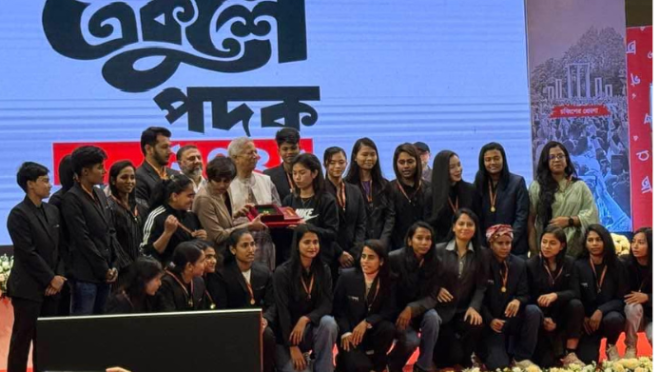SAFF women championship winners get Ekushey Padak: A new hope?
SAFF women championship winners get Ekushey Padak: A new hope?

When Ritu Porna Chakma scored the 2nd goal of the 2024 SAFF Women’s Championship Final in the 81st minute against Nepal, Bangladesh were ecstatic. The Tigresses were on route to defend their crown as the football queens of South Asia. A year or so on, they’re now the first team in the history of the country to be awarded with the second highest civilian award. Is this the start of something great? A new hope or is it another false dawn?
An unexpected beacon
The rise of the women’s team was nothing short of a miracle. Neglected by the Football Federation throughout the 2000s and early 2010s, only after the 2012 SAFF Women’s Championship did they start to garner some attention. Golam Rabbani Choton, who was neglected himself, was given the reins to the women’s team, and the miracle man worked his magic first with the U-19 side, which went on to win the SAFF Championship in 2021.
The winning core of that team contributed to the SAFF triumph in 2022, a first for Bangladesh. The win, celebrated by everyone in the country, marked a turning point for the women’s team.
However, this was not the first time Bangladesh won an international tournament, and unfortunately, the country would be unable to capitalise on this success. For that story, we have to go back a couple of decades to the early 2000s, when Ronaldo Nazario was the best player in the world and Oliver Kahn single-handedly got Germany to the World Cup finals in 2002.
A glimpse of the past
The 2003 SAFF Championship win is regarded as the biggest achievement of the Bangladesh Men’s National Football Team. Managed by Georgy Kottan, led by Rajani Kanta Barman, the green and red army won the tournament on the back of Rokonuzzaman Kanchan’s 3 goals and the goalkeeping heroics of their greatest ever goalkeeper, Aminul Haque.
The triumph and the years leading up to it promised a golden time for the team ahead, however that would be far from the truth. The team steadily declined following 2003 and since then have only managed to reach the semifinals twice, in 2005 and 2023. During this time the team slumped to 197 in the FIFA rankings, a far cry from the heights of the 1990s where they reached the top 120s.
Accusations of corruption, nepotism in the board along with the lack of infrastructure and funding have been repeatedly labelled as the causes behind the downfall of football in the country, with the 2005 national team manager Dido prophesying the decline in his last interview.
Against all odds
The Football Federation’s negligence was bare for all to see in both cases but especially for the women. Lack of infrastructure, funding and bare minimum grassroots development meant that even after showcasing their brilliance on the international stage, the Tigresses had to fight every step of the way.
The infamous picture and interviews which rarely showcased the winning team painted the picture of what the team had to deal with. They had been rarely supported and this victory of theirs was being claimed by the same people who neglected them for decades. But even this gross carelessness wouldn’t stop the likes of Sabina Khatun, Maria Manda and Ritu Porna Chakma from becoming national heroes and household names.
Wonderful, yet wobbly
Following their international stage victory, there are high hopes on their shoulders. Climbing to no.132 in the FIFA Women’s rankings, they are at the highest position they have ever been.
However, there is a long way to go. Still behind the likes of Cook Islands, New Caledonia, Mongolia and even Nepal, the Tigresses have the potential to become a powerhouse in Asian women’s football. The talent is there for all to see but the recent rift between head coach Peter James Butler and the winning core has seen the dark clouds of instability loom over the team.
BFF have a hard task on their hands. How to integrate the rebels back into the fold and steer the ship to the promised land? But that is what they’ll have to do if they want to avoid the failures of the men’s team in the mid-2000s. A failure that still haunts the Red and Green to this day, a nightmare that they are just waking up from.
The Women’s team has lit the beacon of hope for a generation of football fans, a beacon that they want to carry over to the FIFA World Cup, a land no South Asian team has ever set foot in. Only time will tell if history will repeat itself or will the female phoenix rise from the ashes of a heart broken nation?


